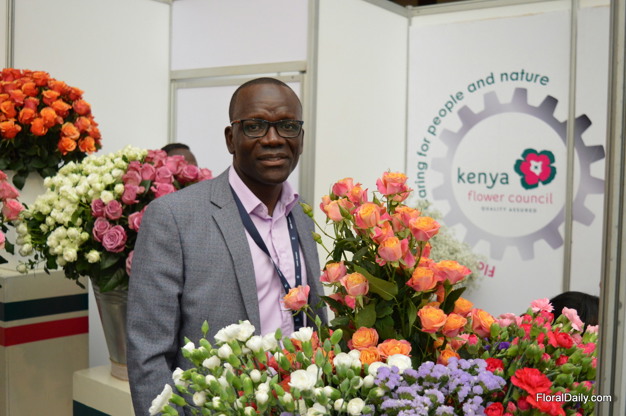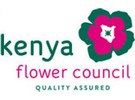Lifting produce from Nairobi to other markets is still a major challenge due to limited freight capacity. During the holiday season in July and August, as the demand is usually low during this time of the year, growers had less problems shipping the demanded flowers, but as the holiday season is almost over, challenging times are ahead. In September, demand will increase again and freight capacity available is still too low.
Kenya Flower Council (KFC) is doing its utmost best supporting the industry to enable them ship their flowers. They are talking with the airlines as well as the government to lower the costs for the grower in different areas. "The demand is there, but getting the product to market, and for a reasonable price, is still a challenge", says Clement Tulezi, CEO at KFC.

Clement Tulezi at the IFTEX 2019 in Nairobi, Kenya.
Direct demand doing well
The volumes being exported are not back at the same level as pre-COVID-19, but are definitely better than in March and April, explains Tulezi. "From Mid-March till the end of April, we were down 80 percent. We were only exporting 20 percent of what we expected to export. Fortunately, after European Mother's Day, demand went up and now, demand is still there and growers are getting orders again. And particularly the growers who supply the direct market. The auction is still less as, in terms of volume." Currently, about 50 percent of the Kenyan Flowers are being exported to the direct market.
Air freight a major challenge
Even though the demand is there, getting the flowers to their final destination is still a challenge as freight capacity is still to low. "Over the last months, as the demand was low due to the holiday season, we were able to manage it, but in September, the capacity will not be enough. On average, we need 3,800 tons per week, but now, even with the onset of passenger flights, we are still less than 3,000 tons per week."
And besides the low capacity, the costs are also still much higher than pre COVID-19. "They are almost double than before and it eats both in the profit and production costs." It is particularly challenging as their main competitors, growers in Ethiopia, are not having to deal with this issue as they have enough capacity due to their national airline.
September will be the big test
Like everyone else, Tulezi hopes that the COVID-19 infections will go down. Then, there will be less demand for medical supplies and there will be more room again for flowers, he explains. Due to the need for medical supplies and as countries are willing to pay more for these shipments, a lot of carriers shifted from shipping flowers to medical products. "We dropped from about 15 carriers to 4 carriers in April. Now, we are at about 7 to 9 carriers." So, in September, when the demand is expected to increase again. It will be the big test to ship the demanded flowers."
In touch with the airlines
KFC is having a lot of discussion with carriers to interest them to come back to Nairobi. "Firstly, we give them data on how much volume we have in Nairobi and show them that there is demand for flowers. Secondly, we've been talking with the government to come with a stimulus package for airlines. So, instead of charging double they can charge the growers less or similar prices as pre-COVID. In total, the government has a stimulus package available of 100 million euro to support the horticulture industry in Kenya and we hope that a part will be available to the airlines. Finally, we show the airlines that we can consolidate produce in Nairobi. This will cut extra costs for the airlines as they do not have to pick up small shipments across the region. So, at the moment, we are talking with partners to realize the plans of consolidating in Nairobi."
What is being done for the farms
Also for the farms, KFC is doing their utmost best. "We are investing our efforts in putting money in the pockets of our growers and exporters. We as KFC have had discussions with the government regarding giving back the Value Added Tax refunds and it worked. Two months ago, the government released almost 70% of which they were owning the growers for many years. Now, the growers have some money in their pockets to keep on going. And in the coming months, the government promised to pay off all our member 100% percent." On top of that, KFC is also talking with the government about the current taxes. "We are trying to convince them to give our growers rebates or delayed payments of some taxes so that the growers can meet their costs."
KFC has also made some great gestures to the farm workers. A total of 6,000 workers across 28 farms received dispatched food packages as a relief measure due to disruption of income as a result of COVID-19 pandemic. "In Kenya, we have very skilled workers and it is very important to keep them on the farm. We were glad to see the positive reactions of the workers with this small gesture. Resources were limited, but we would love to do it again with another partnership. We are trying to find a way to keep them on the farms; we are doing whatever we can."
How are the farms doing?
So far, the farms are still in business. Currently, most workers are again back on the farm and Tulezi explains that they are very pleased with how the government supported them along the way. "When there were restrictions in terms of movement, the government allowed our produce and employees to move. Also cargo flights were still allowed to come in. This was a very good move of the government. If they restricted it, it would all have been much more difficult for the growers."
Expectation: same hectares, but less growers
So far so good, but Tulezi expects that things will change and that these changes will become visible in 2021. "We expect to see more mergers among farms and the smaller farms being taken over by the bigger farms. All in all, we do not expect the cultivation hectares to shrink, only the number of companies. The farms that are not embracing efficiency will have to close. Fortunately, we have not seen it yet, but we expect this to see next year."
Recovery of the industry
When talking about the recovery of the industry, Tulezi expect this to happen Mid 2021. However, governmental support is important. "It is an industry that employs over 200,000 people and has an annual turnover of 1 billion USD. The government needs to look at us as a special category. Now, with the current tax, it is difficult to expand as an industry. So, if they want us to grow, they need to give us some leverage on that and that is what we as KFC are lobbying on behalf of our members and the industry."
"All in all, the Kenyan flower industry will exist in the future. It might not be that glossy in the coming months, but it will be in the future", he concludes.
For more information: Kenya Flower Council
Kenya Flower Council
Suite 12, 4th Floor,
The Greenhouse Building,
Adams Arcade, along Ngong Road
Mobile: (254) (0)733 639 523
info@kenyaflowercouncil.org
kenyaflowercouncil.org
